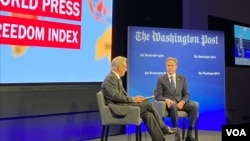Press freedom is under threat now more than ever, but there is still reason to be hopeful, journalists said at a Wednesday event commemorating the thirtieth anniversary of World Press Freedom Day.
Reporters, press freedom experts and U.S. Secretary of State Antony Blinken gathered at The Washington Post headquarters in the nation’s capital to discuss the most pressing challenges and threats facing journalists around the world, ranging from arrest and disinformation to physical assaults and lawfare.
Russia’s arrest last month of American Wall Street Journal reporter Evan Gershkovich on groundless espionage charges was widely condemned during the event.
“We know that journalists around the world are increasingly under siege,” Blinken said. “That’s now manifested itself once again very powerfully in Evan’s detention and incarceration in Moscow.”
“We have a country in the case of Russia that, like a handful of other countries, is wrongfully detaining people, using them as political pawns, using them as leverage in a practice that is absolutely unacceptable,” Blinken said.
In 2022, at least 363 reporters were detained over the work, marking a new global high and a 20% increase from 2021, according to the press freedom group the Committee to Protect Journalists.
Blinken’s conversation with Washington Post columnist David Ignatius was briefly interrupted when a few protesters stormed the stage calling for the release of Julian Assange, the jailed WikiLeaks founder whom the United States has accused of espionage for releasing leaked U.S. military documents.
See related video by VOA's Cindy Saine:
The Wall Street Journal’s Washington bureau chief Paul Beckett said Evan “was drawn back to Russia as a journalistic duty, to report on a country that was part of him, but needs a lot of explanation to an international audience.”
“There’s some foreign correspondents who operate in embassy circles, and diplomatic circles and government circles. And there’s some who operate on the ground,” Beckett said. “And he’s very, very much an on-the-ground reporter—perfectly comfortable in those other circumstances, but really brought the country alive by being out there.”
Harassment, retaliation, prison
On another panel, multiple journalists discussed the harassment, retaliation and jail time they had personally experienced as a result of their work.
Adefemi Akinsanya, an international correspondent at Arise News in Nigeria, recalled how police physically assaulted her in 2021 while she was covering memorials marking the one-year anniversary of killings of protesters in the city Lagos.
“I was defending myself and my person. I was defending the members of my team. I was defending our equipment. But I think, inadvertently, I was also defending free press,” Akinsanya said. “And what we didn’t realize in the moment was that that attack was so much more than us.”
Danny Fenster, an American journalist who was arrested in Myanmar in May 2021, said that his arrest was likely intended to intimidate other journalists and stop them from covering the post-coup situation in the country.
At the time, he was managing editor of the English-language news magazine Frontier Myanmar.
“They had, I think, found that they could send a statement to international journalists — ‘Don't come here, don’t pay attention to this,’” Fenster said. “They needed to send a message, even stronger, to the international community.”
Fenster was released in November 2021.
Reporters Without Borders, or RSF, counted the highest number of journalists detained and arrested last year since the press freedom group started counting, said Clayton Weimers, RSF’s U.S. bureau executive director.
But “it’s not all doom and gloom,” Weimers said. “We make progress all the time.”
Sometimes that progress is slow. Nigeria, for instance, is now ranked 123 in the world in terms of press freedom. Last year it was ranked 129.
“That is welcomed, because if it were the other way, we wouldn’t be happy about it,” Akinsanya said. But Nigeria still has a long way to go, she added.
“Even when you’re confronted with the negative aspects of this work that we do as journalists, the fact that we continue to persevere is hopeful to me,” Akinsanya said.
On Tuesday, an international fund was announced that will aim to support independent media amid its decline.
Guterres shares concerns
At the United Nations in New York, UNESCO marked press freedom day with high-level discussions and panels.
At one, VOA Persian host Masih Alinejad presented a draft resolution condemning transnational repression and the targeting of journalists. Alinejad, who was forced into exile from Iran in 2009, was the target of a kidnapping attempt by Tehran in 2021.
“On this day we call upon all Member States to promote, protect and fulfill the right of freedom of opinion and expression,” several U.N. leaders said in a joint statement. “The safety of journalists and media workers must be considered an integral part of the right to freedom of opinion and expression and key to countering disinformation, including in conflict settings.”
In a statement Wednesday, U.N. Secretary-General Antonio Guterres expressed the importance of press freedom and shared his concerns about threats facing journalists around the world.
“This day highlights a basic truth: all our freedom depends on press freedom,” the Secretary-General said. “Press freedom represents the very lifeblood of human rights.”







